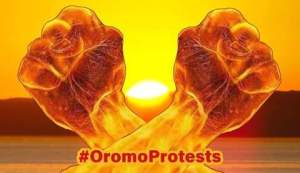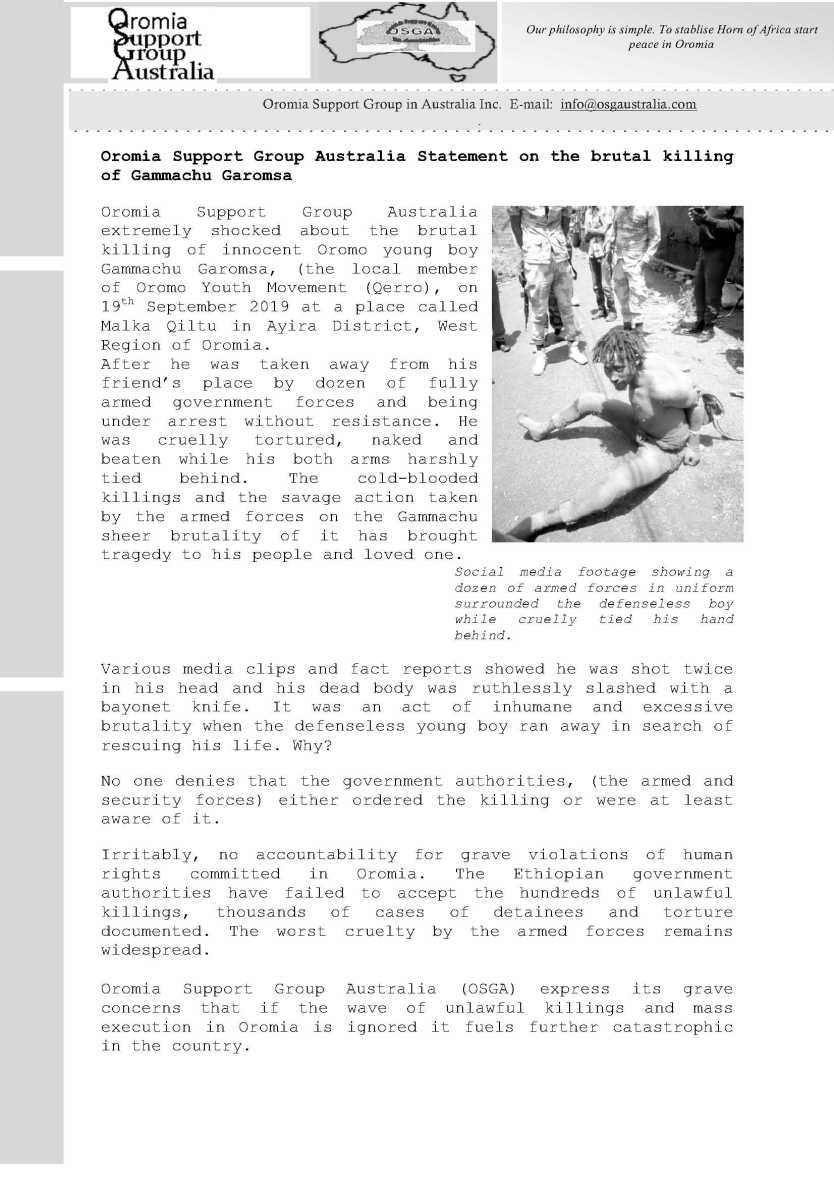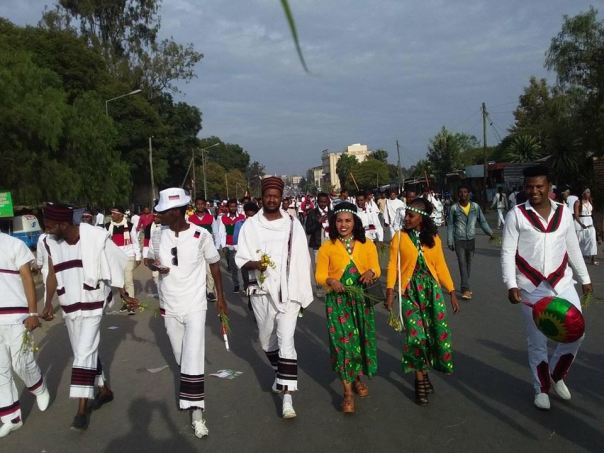Blog Archives
OSG Australia Statement on the brutal killing of Gammachu Garomsa
For the PDF format: Brutal killing and its irrevrsible heartbeaking
Oromia: Irreechaa, a Festival That Promotes Unity and Peace, is undertaking in Bishoftu.
 (30 September 2018) Irreechaa, one of the intangible heritages of the Oromo nation, is colorfully happening in the presence of a large gathering by Lake Hora-Arsedi in Bishoftu town right no.
(30 September 2018) Irreechaa, one of the intangible heritages of the Oromo nation, is colorfully happening in the presence of a large gathering by Lake Hora-Arsedi in Bishoftu town right no.
On this day (normally falls at the end of September or beginning of October), many Oromos come to the river or the sea or the lake with an outlet that has since long been chosen to be the place for such thanksgiving celebration.
Irreechaa comes on the following of Meskel, which comes in tandem with New year. September proves a month where cultural and religious festivals are celebrated one after the other. Hence Irreechaa is one of the jewels in the crown of September.
In the traditional religion of the Oromos, the spirit is the power through which Waqaa (The Almighty God) governs all over the world. Thus, Oromos believe that every creation of Waqaa has its own spirit.
Twice a year
Traditionally, the Oromo practise Irreechaa ritual as a thanksgiving celebration twice a year,on autumn and spring, to praise God for peace, health, fertility and abundance giving regards to people, livestock, harvest and the entire Oromo land.
Irreecha is celebrated as a sign of reciprocating God in a form of providing praise for what they got in the past. It is also a forum of prayer for the future. In such rituals, the Oromo gather in places with symbolic meanings, such as hilltops, riversides and shades of big sacred trees. Irreechaa is celebrated on Sunday that comes following Maskal, the finding of the True Cross. Irreechaa is one of the intangible heritages of the Oromo people. It is an open air festival where millions gather to thank “Waaqa “or God.
Oromo National event
 Irreecha is one of the most colourful and beautiful Oromo National Cultural event that has been celebrated throughout Oromia. At State level Irreechaa is celebrated in Bishoftu Town in Oromia at Lake Hora Arsedi.
Irreecha is one of the most colourful and beautiful Oromo National Cultural event that has been celebrated throughout Oromia. At State level Irreechaa is celebrated in Bishoftu Town in Oromia at Lake Hora Arsedi.
It is important to note the Oromos celebrate the Irreecha irrespective of their religious backgrounds. Whether they are Waaqeffataa, Christians or Muslims they participate in the festival.
On the festival Community leaders and Aba Gada’s praise God for the blessed transition from the rainy season which is normally considered gloomy to the bright and colorful season autumn. The costumes the Oromos put on in different designs lend color to the vibe of the festival. This is one of the things that make the ceremony worth attending.
Most of all, they believe that this spirit (through which Waqaa is supposed to govern all over its creature) wallows over the sea and the great rivers of our world. And also, they do believe that the peak of the mountain is holly in nature, and that it serves as a host to the spirit of Waqaa.
Thus, the Oromos usually go to the river or to the mountain during the time of their worshiping rituals, or during Irreessaa celebration. The celebration is an indigenous Oromo knowledge which has been practiced for centuries now.
The winter, rainy season
 The Oromo People consider the winter rainy season of June to September as the time of difficulty. The heavy rain brings with it lots of things like swelling rivers and floods that may drown people, cattle, crop, and flood homes. Also, family relationship will severe during winter rain as they can’t visit each other because of swelling rivers.
The Oromo People consider the winter rainy season of June to September as the time of difficulty. The heavy rain brings with it lots of things like swelling rivers and floods that may drown people, cattle, crop, and flood homes. Also, family relationship will severe during winter rain as they can’t visit each other because of swelling rivers.
In addition, winter time could be a time of hunger for some because of the fact that previous harvest collected in January is running short and new harvest is not ripe yet. Because of this, some families may endure food shortages during the winter. In Birraa (Spring in Oromo land), this shortage ends as many food crops especially maize is ripe and families can eat their fill. Other crops like potato, barley, etc. will also be ripe in Birraa. Some disease types like malaria also break out during rainy winter time. Because of this, the Oromos see winter as a difficult season. It does not mean the Oromo People hate rain or winter season at all. Even when there is shortage of rain, they pray to Waaqa (God) for rain.
The Oromo People celebrate Irreecha not only to thank Waaqa (God) but also to welcome the new season of plentiful harvests after the dark and rainy winter season associated with nature and creature. On Irreecha festivals, friends, family, and relatives gather together and celebrate with joy and happiness. Irreecha festivals bring people closer to each other and make social bonds.
Moreover, the Oromo People celebrate this auspicious event to mark the end of rainy season, known as Ganna, was established by Oromo forefathers, in the time of Gadaa Melbaa in Mormor, Oromia. The auspicious day on which this last Mormor Day of Gadaa Melbaa – the Dark Time of starvation and hunger- was established on the Sunday of last week of September or the Sunday of the 1st week of October according to the Gadaa lunar calendar has been designated as National Thanksgiving Day by modern-day Oromo People.
In Waqeffannaa religion thanksgiving-Irreecha, the Qaalluus (spiritual leaders) and the Abbaa Malkaas (lineal chiefs of the areas) are at the top hierarchies. In the Qaallu religio-ethics, the Qaalluus give religious instructions and directives of the where-about and the time of the implementation of the rituals.
Appeal Letter to the International Community
by Oromo Civic Organizations
 (Advocacy for Oromia, March 05, 2018) We, members of the Oromo civic and professional organizations, write this urgent letter to appeal to international organizations and governments to save helpless, peaceful citizens trapped under a repressive regime in Ethiopia which has decided to rule through state terrorism.
(Advocacy for Oromia, March 05, 2018) We, members of the Oromo civic and professional organizations, write this urgent letter to appeal to international organizations and governments to save helpless, peaceful citizens trapped under a repressive regime in Ethiopia which has decided to rule through state terrorism.
The Tigrayan People’s Liberation Front (TPLF) led Ethiopian government, representing a minority ethnic group, which has ruled Ethiopia with an iron fist since the early 1990’s, has unleashed what can be described as state terrorism in the last few years on defenseless people for peacefully demanding their basic democratic rights. The most populous state in the country, Oromia, has particularly faced the brunt of the regime’s ire, as widely documented by reputable human rights and international media organizations. Thousands have been killed, and tens of thousands have been arrested, tortured, displaced and exiled. On October 2, 2016 alone, government security forces fired on millions of people who gathered for the annual Irreecha festival, near the city of Bishoftu, killing hundreds and maiming many more. Following this massacre, the government imposed a ten-month state of emergency, during which over 30,000 people were arrested and kept in concentration camps without a due process of law. In what is arguably the worst humanitarian disaster to have befallen the Oromo people yet, close to one million Oromo have been displaced from their home in the eastern and southeastern regions, because of TPLF’s vicious proxy war on the Oromo via the so-called Liyu-Police of the Somali region of Ethiopia. Most of the internally displaced are still living in temporary shelters, facing an uncertain outcome and a bleak future.
Faced with a growing dissent, the TPLF regime has re-imposed a state of emergency on February 16, 2018, curtailing fundamental human rights and giving its army a wide latitude to take extrajudicial actions with impunity. This new law is totally uncalled for, as the government is fully in control and has no justification to use an extraordinary measure to maintain peace and order. Many foreign governments and independent observers believe that declaring a state of emergency at this time is unnecessary and counter-productive. The United States Embassy in Ethiopia “strongly disagrees with Ethiopian government’s decision to impose a state of emergency that includes restrictions on fundamental rights such as assembly and expression.” Opposition political parties, civic and religious organizations have also condemned the declaration of the state of emergency. The decree does not even meet the conditions stipulated in TPLF’s own constitution which requires an extraordinary situation to declare a state of emergency. It is, therefore, illegal.
Yet even before the state of emergency was approved, the regime has intensified its implementation, severely restricting the freedom of movement and expression. On February 23, for example, government forces prevented leaders of the Oromo Federalists Congress (OFC), Dr. Merera Gudina and Bekele Gerba, from visiting their relatives and meeting supporters in Wallaga, western Oromia.
After their release from prison just last month, they were forced to stay in an open field, 20 miles away from the city of Nekemete, because federal forces, who have been harassing and terrorizing residents, blocked the road and ordered them to go back to Addis Ababa (Finfinnee) On February 26, soldiers fired live ammunition and killed one person, Abebe Makonnen, and wounded at least 19 people. Another person was killed and 5 others were wounded in the town of Ukkee, north of Nekemte, on February 27 and 28, 2018. Further west, in Dembi Dolo, government forces have prevented the distribution of leaflet for a religious gathering and killed one person and wounded several others. On February 27, the Command Post, a military unit set up to administer the state of emergency, and led by Siraj Fergessa, Defense Minister, authorized the federal defense forces to take any action against protesters.
The Command post’s directive gives an extraordinary power to the armed forces and allows them to unleash unmitigated violence against civilians. The state of emergency clearly violates the country’s constitution and other international human rights treaty obligations that Ethiopia has agreed to observe.
The behavior of the Ethiopian regime is outrageous on many levels. While Ethiopia hosts many international organizations including: the headquarters of the African Union (AU), the Economic Commission for Africa (ECA), and numerous diplomatic missions; the EPRDF regime flagrantly violates
human rights with impunity. Helpless and defenseless people wonder who would come to their rescue when their government manipulates the laws and kills them, evicts them from their lands, and displaces them routinely.
The outrage of the people has been simmering for years and their patience has reached its limits. This volatile situation can get out of control at any moment. Unfortunately, if this happens, many more lives could be lost; property could be destroyed, the Horn of Africa region could face an imaginable displacements and mass migrations. In short, the consequences could be catastrophic not only for the Oromo and the peoples of Ethiopia, but also for the northeast African region and the global community.
Grieving of the losses we have suffered so far, due to the brutal acts of TPLF/EPRDF regime, and fearful of the looming human sufferings, we strongly appeal to the international community and organizations to act fast and save innocent lives, prevent violence and displacements. We particularly appeal to:
1. The United Nations, the African Union, the Arab League, and the European Union to stop the Ethiopian government from continuing very dangerous political path;
2. The United Nations Security Council to authorize the investigation of the violations of human rights and international human rights treaty obligations, the crimes committed by the Ethiopian regime;
3. The United Nations Human Rights Commission to investigate previous the human rights violations and other committed crimes under current state of emergency law in Ethiopia;
4. The World Bank and International Monetary Fund (IMF) not to provide financial assistance to Ethiopia, except for humanitarian reasons, to force the government end its repressive behavior;
5. The governments of the United States, United Kingdom, Canada, Egypt, Germany, Italy, Norway, Sweden, South Africa and other nations to put all necessary diplomatic pressure, and financial and trade restrictions to end the state of emergence, respect the rights of citizens and open the political space for democracy and freedom;
6. All peace-loving global communities to put necessary pressure on their respective governments to end assistance to the Ethiopian government and support the Oromo and other peoples in Ethiopia at this critical moment.
Ultimately, the TPLF/EPRDF leaders and their partners will be fully, legally and historically, accountable for the criminal acts they are committing under the cover of the state of emergency.
Last but not least, if our urgent warnings are ignored and the ominous tragedies we fear take place, history will harshly judge the inaction of the international community, appropriately.
Sincerely,
Oromo Civic and Professional Organizations
• Global Gumii Oromia (GGO)
• Oromo Communities Association of North America (OCA-NA)
• Macha-Tulama Association (MTA)
• Oromo Studies Association (OSA)
• Oromia Support Group (OSG)
• International Oromo Lawyers Association (IOLA)
• International Oromo Women’s Organization (IOWO)
• International Qeerroo Support Group (IQSG)
• Human Rights League for the Horn Of Africa (HRLHA)
CC:
Organizations: UN, AU, EU, AL, WB, IMF
Governments: US, UK, Canada, Australia, China, Egypt, Germany, Norway, Italy, Russia, Sweden, South Africa, [Others]







